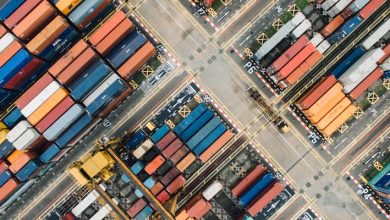How Blockchain Technology is Shaping a Decentralized Future

- Understanding the Basics of Blockchain Technology
- The Rise of Decentralized Applications
- Exploring the Impact of Blockchain on Various Industries
- Challenges and Opportunities in the Decentralized Future
- The Role of Smart Contracts in a Decentralized Ecosystem
- Regulatory Frameworks for Blockchain Technology
Understanding the Basics of Blockchain Technology
Blockchain technology is a revolutionary concept that is changing the way we think about data storage and transactions. At its core, a blockchain is a decentralized, distributed ledger that records transactions across a network of computers. Each transaction is added to a “block,” which is then linked to the previous block, creating a chain of blocks – hence the name “blockchain.”
One of the key features of blockchain technology is its transparency. Because the ledger is distributed across multiple computers, everyone on the network can see the transactions that have taken place. This transparency helps to ensure the integrity of the data and reduces the risk of fraud or tampering.
Another important aspect of blockchain technology is its security. Each block is encrypted and linked to the previous block using a cryptographic hash, making it nearly impossible to alter the data retroactively. This makes blockchain technology ideal for use cases where data security is a top priority, such as financial transactions or supply chain management.
In addition to security and transparency, blockchain technology also offers increased efficiency. By removing the need for intermediaries in transactions, blockchain technology can streamline processes and reduce costs. This is particularly valuable in industries such as banking, where transactions can be slow and expensive due to the involvement of multiple parties.
Overall, blockchain technology has the potential to revolutionize many aspects of our lives by creating a more decentralized and secure way to store and transfer data. As this technology continues to evolve, it will be exciting to see how it shapes our decentralized future.
The Rise of Decentralized Applications
Decentralized applications, or dApps, are becoming increasingly popular in the blockchain space. These applications operate on a peer-to-peer network rather than a centralized server. This shift towards decentralization offers several benefits, including increased security, transparency, and censorship resistance.
One of the key advantages of dApps is their ability to eliminate single points of failure. Unlike traditional applications that rely on a central server, decentralized applications are distributed across multiple nodes. This makes them less vulnerable to cyber attacks and other security breaches.
Furthermore, dApps are transparent by design, as all transactions and data are recorded on the blockchain for anyone to see. This level of transparency helps to build trust among users and ensures the integrity of the application.
Another important feature of decentralized applications is their censorship resistance. Because dApps are not controlled by any single entity, they cannot be easily shut down or censored. This makes them ideal for applications that require freedom of expression and information sharing.
Overall, the rise of decentralized applications is shaping a future where individuals have more control over their data and digital assets. As blockchain technology continues to evolve, we can expect to see even more innovative dApps that empower users and promote a decentralized ecosystem.
Exploring the Impact of Blockchain on Various Industries
Blockchain technology has been making waves across various industries, revolutionizing the way businesses operate and interact with customers. The impact of blockchain is far-reaching, with its decentralized and secure nature offering benefits that were previously unimaginable. Let’s explore how blockchain is transforming different sectors:
1. **Finance**: In the finance industry, blockchain is disrupting traditional banking systems by enabling faster and more secure transactions. By eliminating intermediaries, blockchain reduces costs and increases transparency. This technology is also being used for cross-border payments, smart contracts, and asset tokenization.
2. **Healthcare**: Blockchain is revolutionizing the healthcare sector by improving data security and interoperability. Electronic health records stored on a blockchain are encrypted and immutable, ensuring patient privacy and data integrity. Additionally, blockchain is streamlining processes such as insurance claims processing and drug traceability.
3. **Supply Chain**: Blockchain is optimizing supply chain management by providing real-time visibility into the movement of goods. With blockchain, companies can track products from the point of origin to the end consumer, ensuring authenticity and preventing counterfeiting. This transparency also helps in identifying inefficiencies and reducing fraud.
4. **Real Estate**: The real estate industry is leveraging blockchain for property transactions, title deeds, and smart contracts. Blockchain’s decentralized ledger eliminates the need for intermediaries, reducing paperwork and speeding up the buying/selling process. This technology also ensures the accuracy of property records and prevents fraud.
5. **Retail**: Blockchain is enhancing the retail sector by enabling transparent supply chains, loyalty programs, and customer data protection. With blockchain, retailers can track products’ origins, ensure ethical sourcing, and reward customer loyalty through tokenized incentives. This technology also enhances data security, protecting consumers’ sensitive information.
6. **Education**: Blockchain is transforming the education industry by providing secure credentialing and verification of academic records. With blockchain, students can store their certificates, degrees, and achievements on a tamper-proof ledger, eliminating the risk of forgery. This technology also facilitates the sharing of educational data across institutions.
In conclusion, blockchain technology is reshaping various industries by improving efficiency, transparency, and security. As businesses continue to explore the potential of blockchain, we can expect further innovations and disruptions in the way we conduct transactions and manage data. Embracing this decentralized future will undoubtedly lead to a more interconnected and trustworthy global economy.
Challenges and Opportunities in the Decentralized Future
In this decentralized future enabled by blockchain technology, there are both challenges and opportunities that come with this shift in how we organize and transact. One of the main challenges is the potential for increased cyber threats and security vulnerabilities as more data is distributed across various nodes in a network. However, this also presents an opportunity for innovative solutions to emerge, such as enhanced encryption methods and decentralized identity management systems.
Another challenge is the regulatory uncertainty surrounding blockchain technology and cryptocurrencies. As governments around the world grapple with how to regulate this new form of digital assets, there is a risk of stifling innovation and adoption. On the flip side, this presents an opportunity for collaboration between industry stakeholders and regulators to create a more conducive environment for blockchain technology to thrive.
The decentralized nature of blockchain technology also poses challenges in terms of scalability and interoperability. As more transactions are processed on a blockchain network, there is a risk of bottlenecks and delays. However, this also presents an opportunity for developers to find creative solutions to improve the efficiency and speed of transactions, such as implementing layer 2 scaling solutions and cross-chain interoperability protocols.
Overall, the challenges and opportunities in this decentralized future are vast and multifaceted. It will require collaboration, innovation, and adaptability to navigate the complexities of this new paradigm shift. As we continue to explore the potential of blockchain technology, it is crucial to stay informed, proactive, and open-minded to fully realize the benefits it can bring to society.
The Role of Smart Contracts in a Decentralized Ecosystem
Smart contracts play a crucial role in a decentralized ecosystem by automating the execution of agreements without the need for intermediaries. These self-executing contracts are stored on a blockchain network, ensuring transparency and security in transactions. Smart contracts are designed to enforce the terms of an agreement automatically once predefined conditions are met. This eliminates the need for a trusted third party, reducing the risk of fraud and lowering transaction costs.
By leveraging blockchain technology, smart contracts enable peer-to-peer transactions to occur seamlessly and securely. They can be used in various industries such as finance, real estate, supply chain management, and more. Smart contracts have the potential to revolutionize the way business is conducted by streamlining processes, improving efficiency, and enhancing trust among parties.
One of the key advantages of smart contracts is their ability to eliminate human error and bias in contract execution. Since they are based on code and operate automatically, there is less room for mistakes or manipulation. This ensures that agreements are executed exactly as intended, providing a high level of reliability and trust in the decentralized ecosystem.
Regulatory Frameworks for Blockchain Technology
Blockchain technology has been gaining traction in various industries due to its decentralized nature and enhanced security features. However, the regulatory frameworks surrounding blockchain technology vary from country to country, which can impact its widespread adoption and integration.
In some regions, governments have taken a proactive approach to establish clear guidelines and regulations for blockchain technology. These regulations aim to protect consumers, prevent fraud, and ensure compliance with existing laws. By providing legal clarity, regulators can encourage innovation and investment in blockchain technology.
On the other hand, some countries have been slow to implement regulatory frameworks for blockchain technology. This lack of clear guidelines can create uncertainty for businesses and investors looking to leverage blockchain technology. Without proper regulations in place, there is a risk of misuse and abuse of blockchain technology for illegal activities.
Overall, the development of regulatory frameworks for blockchain technology is crucial to ensure its responsible use and foster its growth in a decentralized future. By striking a balance between innovation and regulation, governments can create an environment that supports the benefits of blockchain technology while mitigating potential risks. As blockchain technology continues to evolve, it will be essential for regulators to adapt and update their frameworks to keep pace with these advancements.



